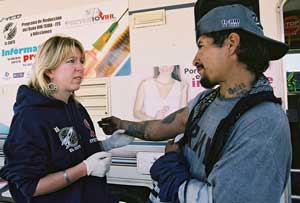Fogarty awards HIV/AIDS research training grants
June 2010 | Volume 9, Issue 3

Photo by Bob Ross, courtesy of UCSD
Fogarty grantee Dr. Steffanie Strathdee counsels an
intravenous drug user who lives in an open sewer in
the Tijuana River canal.
The U.S.-Mexico border region is currently experiencing a significant rise in documented cases of HIV in high-risk populations. Fogarty has addressed this problem by awarding a new grant to train much-needed HIV/AIDS researchers in the border region. Through the
AIDS International Training and Research Program (AITRP), funds awarded to the University of California, San Diego, and its partner institutions in Mexico will increase expertise in infectious disease prevention.
Several renewal grants supporting ongoing HIV/AIDS projects were also issued. The University of Maryland, Baltimore, will use its funding to bolster mentor-to-mentor training in Nigeria. A grant to Brown and Tufts Universities will help establish a pilot training site in Ghana. Columbia University’s award will fund ongoing HIV and TB research training in South Africa, Swaziland, Namibia and Lesotho. Finally, SUNY Downstate Medical Center will continue to focus on the rapidly increasing HIV epidemic resulting from intravenous drug use in Central Europe and Russia.
The new border region project will include the creation of an interdisciplinary education program by researchers at the University of California, San Diego. The funding will also allow the primary partner institution, the Autonomous University of Baja California, to provide advanced training in prevention of HIV, other sexually-transmitted infections and tuberculosis. Additionally, training will be offered via distance learning.
More Information
To view Adobe PDF files,
download current, free accessible plug-ins from Adobe's website.